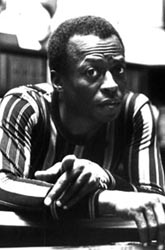|
The Prestige/Blue Note Years Miles and Coltrane Miles and Gil Evans The Prince and the Blackhawk Seven Steps The Quintet 1965-8 The Plugged Nickel Silent Ways Bitches Brew The Jack Johnson Sessions The Cellar Door 1970s Miscellaneous The name and image are synonymous with jazz: the dark prince and his trumpet. Technique well short of bop-era trumpeters, Miles found his style by omitting extraneous notes and focusing on the most evocative ones. They took meaning from timbre (his fragile sound is one of a kind), rhythmic placement, and creative relation to the chord at hand. Miles could summon a mood with one note or phrase in the right place at the right time. I take issue with his chops when he pushes their limits (his early '50s playing is up and down), but there’s no doubt that his individuality wins out in the end. At his best, from the mid-50s through the 1960s, he is one of the most elegant, profound soloists ever. So there’s the trumpet playing, for one thing, to earn him legendary status. However, I say his greatest skill was as a bandleader, or more accurately, a band-assembler. Miles was a visionary, and he was responsible for at least a few jazz subphyla: cool, modal, fusion, etc. These new things were only possible because of the players Davis surrounded himself with, the guys who (as Miles sensed) would have a group chemistry that took the music to new places. In other words, Miles didn’t always know exactly what he was looking for, but he knew that if he put a particular configuration of creative players together, something special might emerge. He knew that Bill Evans was the guy to tap when going modal with Kind of Blue. He knew that the Hancock/Carter/Williams trio would be the one to ride the modern ‘60s wave. He knew that the odd congress of Bitches Brew players would generate an interesting rock-jazz fusion. So when I see or hear the word MILES, it doesn’t just mean a solitary figure holding a trumpet; it signifies the music that was the work of many people, guided by Davis. Miles was not really a composer. He mainly absorbed other people’s firsthand ideas and sculpted them into something new. At the crudest level, this applies to the outright tune thievery that he was notorious for. At the more collaborative level, it means he could take a starting premise from, say, Herbie Hancock (“Madness”), cut some bits and twist others, and wind up with something more unique. That’s why I think of him as a visionary. It starts with him imagining a larger emotional picture. Then he gathers the tunes, gets the right people together, and he shepherds the music into a special place. Or with his later music (like A Tribute to Jack Johnson), it’s enough to just let the right group play by themselves with no tunes at all, and the ensuing improvs can then be crafted into an artistic statement. The composer credits on the fusion albums are dishonest. The album cover tag “Directions In Music By Miles Davis” is more accurate, immodest as it might be. Personally, he was a study of contradictions. His music came from a sensitive soul, yet he wasn’t so sensitive that he refrained from misogyny (and physical abuse), or a crude public persona. Perhaps he wore a tough mask to cover for the shy man inside. At any rate, the masked persona could promote its own genius and quickly find faults in peers. In fact, his many disparaging proclamations on other players hint at an unwarranted inferiority complex. Miles had a lot of crude things to say about race as well, even though he was an equal-opportunity musician who could thrive on working with creative ofays - two of his most intimate musical relationships were with Evanses Gil and Bill. Former sidemen speak highly of the musical experience with Miles, and their personal stories reinforce the idea of Miles as a cryptic figurehead. His autobiography didn’t bring us any closer to him, really, since it was a patchwork of various writers.
But forget the shady personality. What survives is a stunning recorded legacy and the continuing influence that it will always have on jazz at large. Miles Davis is one of the most significant musical figures of the twentieth century.
|
